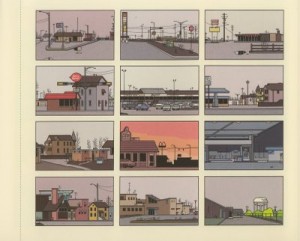Wow – there’s a lot going on in Jimmy Corrigan. I really enjoyed the text, but with so many different themes, visual motifs, and parallel story lines – I’m sure this is a graphic novel where one constantly discovers new things on subsequent readings. But one really strong impression the text left with me is the sense that history is all-pervasive, even in the most mundane aspects of life.
Jimmy’s convoluted family history is at the center of the text, and the sections on Grandpa Jimmy’s childhood give readers a direct view into Chicago’s history and the World’s Fair. But throughout the story, the more mundane aspects of everyday life also seem to be loaded with history. The page about halfway through the text, with twelve panels of restaurants, stores, gas stations, etc. seemed to really hit on this idea. The blurbs on the back of each image provide a roundabout history of Waukosha. And while the images on the front panel are universally stark and depressing, the titles on the reverse of each panel are comically ironic. The disconnect between the written words on the back of the page, and the images seems to serve as a commentary from Ware on our ability to distort history to make even the most mundane situations seem note worthy.
The veiled reference to Amy in the blurb on the reverse of the Pam’s Wagon Wheel panel directly connects Jimmy’s own story and familial history with the more general overview of the history of Waukosha. This connection is seemingly reinforced with the scene directly following the “History of Waukosha” page, in which Jimmy and his father are also dining at Pam’s Wagon Wheel.
I found this dining sequence between Jimmy and his father to be one of the most fascinating moments of the entire text. Ware’s tactic of continually returning to the image of the table, with its changing dynamic of food, cups, and discarded wrappers was especially interesting. The people responsible for creating the changes we see on the table (Jimmy, his dad, the waitress) are never seen in any of these panels. It’s intriguing that during a moment of such seemingly intense personal drama for Jimmy and his father, Ware always circles back to the mundane image of the table. The sequence of images for the table is cyclical – it starts with the uneaten food and dirty place setting of the previous customers, then shifts to a clean table, then slowly adds cups and food until it ends where it began, with uneaten food and dirty place settings. Perhaps the focus on the mundane in this scene is meant to comment on the cyclical nature of history. In a weird way, by acting as a visual contrast with the awkward conversation between Jimmy and his father, the image seems to reinforce the overall sense of alienation that pervades much of the story, further shattering any idealized notions of family life or father-son relations.
John

I found it interesting as well that the times when we do see the characters around this scene, it focuses much on Jimmy’s indecision. He asks for a coke after the drink orders are placed. Says he’s not hungry and ends up with a tuna melt. This also helps reflect Jimmy’s indecision throughout the text, and the way it helps reveal his lack of depth as a comic “hero.” He is not a person who will ever make a stand, but I also don’t get the impression that he will ever completely lie down. He exists in a state where he goes where the current takes him. He’s not quite being walked all over, but it’s very close. He does what he thinks will make other people happy, and that’s worse than fighting our giving up outright.
Part of me wanted to peg him as being walked all over, but he does speak for himself with Amy, not up for himself, but shares things about his life, and when he does, Amy is too tired (bored) or maybe too fed up with Jimmy to hear it. It seems Jimmy isn’t absent from the world around him, but too awkward, paranoid, or mistrusting to successfully be a part of that world.